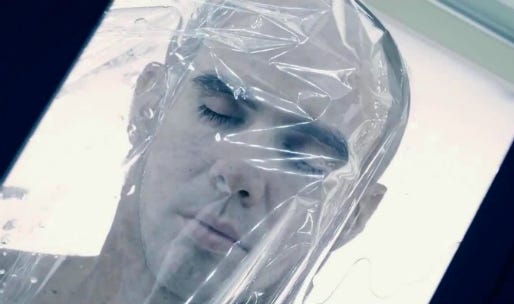Self/less

Mechanical horses are crapshoots, more liable to swallow your coins and sit in immobile defiance than they are to work. But their range of motion is moderate. Back and forth. Back and forth. An appeasing, if familiar, sway. You roll the dice anyway. Could something so simple really be irreparably broken?
There’s a moment in “Self/less” when parents trying to distract their daughter from a heated argument suggest she go “ride the horsey.” She kicks and kicks to make it go, but it won’t budge, and she gives up grunting in disgust.
You’ll feel that frustration, too, with “Self/less,” a ride that stubbornly refuses to deliver its modest thrills no matter how hard its star kicks at it. This second-rate sci-fi thriller hastily, and lazily, slaps together ideas from John Frankenheimer's “Seconds” and “Freejack” with a wan attempt at One-Percenter finger wagging. But it lacks the former’s morbid meditation on midlife crises and the latter’s all-in surrender to B-movie kitsch.
That its frequently tweeting star, Ryan Reynolds, is filling his timeline with promotion of a movie that doesn’t open until 2016 should tell you something. At least his performance makes up for his lack of promotional inclinations. If you endured dross like “Blade: Trinity” and “Green Lantern,” you know Reynolds charitably commits to junk with gusto, and he affably acquits himself again in yet another stinker.
Damian Hale (Ben Kingsley, sporting a ridiculous Noo Yawk accent) is a billionaire real estate magnate whose career cancels out all other aspects of existence. He lives alone, estranged from his grown daughter (Michelle Dockery). While Hale can still fend off young Turk competitors, he’s powerless against cancer consuming his body. Thus, he investigates the Phoenix Corporation’s “shedding” — a quarter billion-dollar procedure to transplant his mind into a healthy, young, lab-grown body.
Newly reinvented as 34-year-old Edward Kitner (Reynolds), Damian’s new life is free and easy — nubile conquests, financial independence via untraceable accounts and the ability to enjoy peanuts in a new body that won’t kill him for eating them. But once Edward / Damian starts hallucinating about military combat and a sick child, it becomes clear his new mortal coil has high mileage.
From there “Self/less” morphs into a poor man’s “Limitless,” as Damian’s morally recalibrated pursuit of the truth leads him into increasingly dangerous situations near New Orleans. (Filmed there for tax breaks, at least “Self/less” is also set there and uses the city’s antebellum aesthetics to its advantage.)
It’s a compliment to say Reynolds poorly imitates Kingsley; Sir Ben has his eye on the exit from the moment he arrives. At least Reynolds seems enlivened by the challenge of embodying two personalities (and maybe more along the way), even if a sense of hopelessness eventually sets in when he realizes this, too, is a clunker.
It’s the latest in a long decline for once-promising director Tarsem Singh (“Immortals” and “Mirror, Mirror”). Gone are the days when fellow filmmakers went out of their way to present his work or the painterly provocations of “The Cell.” There are some snippets of style; one close call with a flamethrower at a picturesque farmhouse feels like David Lynch meets Michael Bay while another melds artist Andrew Wyeth’s “Christina’s World” with chaotic gunplay and fire. But they ultimately feel like shiny, esoteric baubles created by Singh primarily to amuse himself.
The rest of “Self/less” is anonymously made to a point where a second-act car chase tries to appropriate the might of Michael Mann on a Showtime budget. (Such chintz extends to Antonio Pinto’s score; outside of a melancholy cello, it sounds like canned music on a hotel TV’s pay-per-view menu). Maybe you suspect it will eat your money from the get-go, but that doesn’t ease the disappointment when it happens.
